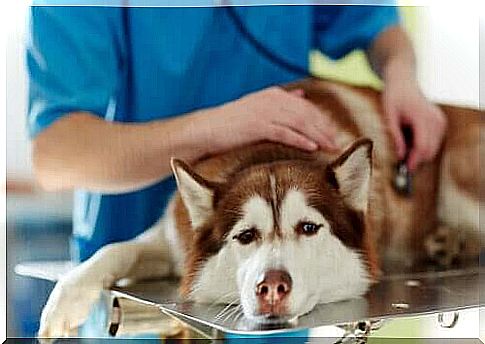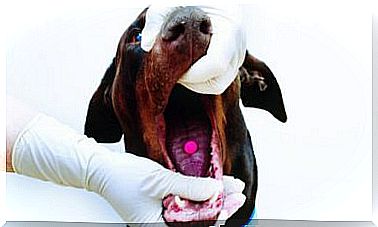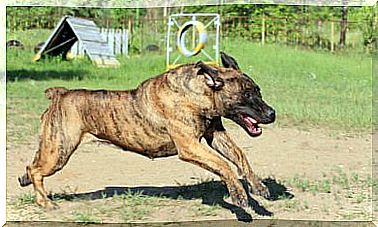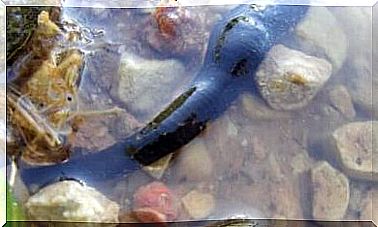The Causes Of Cramps In Dogs

As a rule, dog owners are the first to discover possible symptoms of illness in their pet. Some of these symptoms can also go unnoticed, such as fever, pale mucous membranes, or red ears. But there are also others that are practically impossible to overlook. This is the case with convulsions. So in today’s article we wanted to take a closer look at possible causes of cramps in dogs.
Convulsive Syndrome
First of all, it is important to define what a convulsion (spasm) is. A spasm is the clinical manifestation of transient cerebral dysfunction. It is very important to emphasize the transitory nature of cramps as they can last a few seconds or minutes.
This functional disorder (dysfunction) occurs due to a sudden, massive and synchronized discharge of cortical neurons. In other words, it is as if all neurons were suddenly going from a calm and relaxed state to a completely uncontrolled state at the same time.
This temporary neural chaos leads to the following changes in the dog’s body:
- Loss of consciousness or decreased consciousness. Dogs can pass out. As a result, they no longer respond to external stimuli.
- Uncontrolled or changed muscle movements.
- Abnormal behavior: For example, chasing imaginary flies.
- Activation of the autonomic nervous system: salivation, urination and bowel movements.
In addition, we would like to point out that a seizure in dogs is always a sign of an illness, but not an illness in itself. Therefore, veterinarians always treat this disorder as the tip of the iceberg. In other words, convulsions are the starting point from which you need to conduct further research in order to find out what is causing the convulsions and to make a correct diagnosis.

Causes of Cramping in Dogs
We’re going to split the causes of convulsions in dogs into two groups to help explain them.
Intracranial causes
In this case, the change that causes the seizure is in the brain. Any lesion that affects the cerebral cortex can lead to the appearance of convulsions. In general we are talking about:
- Inflammation of the tissue in the brain (encephalitis) in diseases such as canine distemper
- Head trauma as a result of bumps or falls
- Congenital malformations such as hydrocephalus
- Primary neoplasia of cerebral origin and secondary cerebral metastases
- Cerebrovascular accidents
Any of these abnormalities can be one of the possible causes of and triggering convulsions. Logically, the above circumstances and this characteristic neural revolution must take place. This will depend on the region of the brain that has an injury and the severity of the problem.
Extracranial causes of convulsions in dogs
Here we are going to talk about all of the causes of convulsions in dogs that are not the result of a brain injury. In other words, the causes that don’t fall into the previous category. There are pathological processes that develop far from the brain, but have a direct influence on this organ and, as a result, can also trigger convulsions.
- Poisoning: There are several toxins that can cause problems in dogs. Lead, organophosphates, and strychnine are some of the most common triggers.
- Hypoglycemia: Low blood sugar levels can cause cramps , especially in puppies. Therefore, it is important to be careful when feeding puppies to avoid, among other things, hypoglycemia.
- Portosystemic Shunts (PSS): This refers to abnormal communication in the bloodstream, particularly between the venous and arterial circuits. This deviation prevents the liver from cleaning the blood and removing any waste that is present. As a result, “poisoning” occurs in the animal’s body, which can also lead to convulsions.
- Liver problems: Just like with shunts, when the liver fails, the liver cannot properly clear the waste. The medical term for this malfunction is cirrhosis of the liver. It is also one of the causes of convulsions.

Convulsions of idiopathic origin
Occasionally, veterinarians cannot determine what is causing the symptoms because there is no apparent or demonstrable cause. In these cases the term “idiopathic” is used to denote a disease of unknown origin.
In fact, in many cases an exact diagnosis or identification of the underlying disease is not possible. Hence , it is also the number one cause of cramps in dogs. However, with proper treatment, the prognosis is usually good.
Today we took a closer look at the most common causes of convulsions in dogs. Nevertheless, the triggers and reasons can be diverse and in any case require immediate action.
So if you suspect your dog is suffering from convulsions, you should see a veterinarian immediately.








